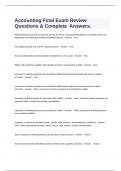Exam (elaborations)
Accounting Final Exam Review Questions & Complete Answers.
- Course
- Accounting
- Institution
- Accounting
When financial records for a business and for its owner's personal belongings are not mixed, this is an application of the Business Entity accounting concept. - Answer True The capital account is an owner's equity account. - Answer True An accounting device used to analyze transactions ...
[Show more]



